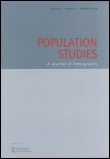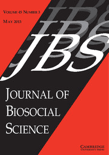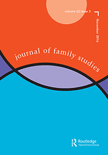
GENUS
Scope & Guideline
Unlocking Insights into Population Dynamics
Introduction
Aims and Scopes
- Demographic Studies and Population Dynamics:
GENUS publishes research that examines the demographic trends and patterns across various populations, analyzing factors such as fertility, mortality, migration, and family structures. - Gender Studies and Social Inequality:
The journal focuses on gender-specific issues, exploring how gender roles and expectations shape social dynamics, particularly in relation to family responsibilities, career advancements, and health outcomes. - Family and Household Dynamics:
Research on family structures, childcare arrangements, and the impacts of family policies is a central theme, highlighting how these factors influence individual and collective well-being. - Migration and Integration:
GENUS investigates the experiences of migrants, including their integration into host societies, socio-economic outcomes, and the intersection with family dynamics. - Longitudinal and Comparative Analyses:
The journal emphasizes empirical research using longitudinal data and comparative methodologies to draw insights across different contexts and time periods.
Trending and Emerging
- Impact of COVID-19 on Demographic Patterns:
Recent publications have extensively analyzed the effects of the COVID-19 pandemic on mortality, mental health, and family dynamics, highlighting the pandemic's unprecedented impact on demographic trends. - Gender and Fertility Intentions:
There is a growing interest in understanding how gender roles and attitudes influence fertility intentions, particularly in the context of changing family policies and economic conditions. - Migration and Integration Policies:
The journal has seen an increase in studies addressing the integration of migrants and the socio-economic implications of migration, reflecting global shifts in migration patterns and policy responses. - Childcare and Family Policies:
Research on the effects of childcare availability and family policies on fertility and labor market outcomes has gained prominence, emphasizing the intersection of family support systems and demographic behavior. - Sociodemographic Inequalities:
Emerging research is increasingly focused on the intersection of social inequality and demographic outcomes, particularly how socioeconomic status affects health, education, and family dynamics.
Declining or Waning
- Historical Demography:
Research focusing on historical demographic trends, such as those related to the birth and death rates of past centuries, has become less frequent, possibly due to a growing emphasis on contemporary issues. - Studies on Traditional Family Structures:
There has been a noticeable decrease in studies centered on traditional family structures, as the journal increasingly prioritizes research on diverse family forms and the impacts of modern socio-economic changes. - Rural Demography:
The focus on rural population studies has waned, with a stronger emphasis on urban demographic dynamics and their implications, reflecting broader societal shifts towards urbanization. - Mortality Studies in Non-Contemporary Contexts:
While mortality studies remain important, there is less emphasis on historical or non-contemporary contexts, with current trends favoring analyses of contemporary mortality patterns, particularly in light of recent health crises.
Similar Journals

Comparative Population Studies
Empowering researchers with open access to demographic knowledge.Comparative Population Studies is an esteemed open-access journal published by the BUNDESINSTITUT BEVOELKERUNGSFORSCHUNG in Germany, dedicated to advancing the field of demography. Since its launch and transition to open access in 2010, the journal has provided a platform for researchers to share innovative population studies, promoting a deeper understanding of demographic trends and patterns globally. With an impressive Q2 rank in Demography within the 2023 quartile categories and a commendable rank #61 out of 139 in Scopus' Social Sciences Demography classification, it plays a vital role in disseminating rigorous research. The journal covers a range of topics related to population dynamics, migration, and social implications, making it invaluable to academics, professionals, and students in the field. With an emphasis on comparative studies, Comparative Population Studies not only fosters scholarly dialogue but also enhances policy-making and economic planning. Located at Friedrich-Ebert-Allee 4, Wiesbaden 65185, Germany, the journal continues to be a prominent resource for those eager to engage with the latest demographic research.

JOURNAL OF POPULATION ECONOMICS
Unveiling the Economic Impacts of Population ShiftsThe JOURNAL OF POPULATION ECONOMICS, published by SPRINGER, stands as a leading peer-reviewed journal in the fields of demography and economics. Established in 1988, this esteemed journal offers a platform for high-quality research that probes the intricate relationships between population dynamics and economic phenomena. With its impressive Q1 quartile ranking in both Demography and Economics and Econometrics for 2023, the journal is recognized as a vital resource for scholars and practitioners alike, reflecting its rigorous standards and impact in the academic community. Its Scopus rankings position it within the top tiers of social sciences, making it an essential read for those engaged in demographic and economic research. Although the journal does not currently adopt an open access model, its esteemed reputation and continuous publication until 2024 ensure relevant and up-to-date findings contribute meaningfully to scholarly discourse. At its core, the JOURNAL OF POPULATION ECONOMICS aims to bridge theoretical insights and empirical findings, fostering an understanding of how population changes influence economic outcomes and vice versa.

Journal of Population Ageing
Transforming Understanding of Demographic TrendsThe Journal of Population Ageing, published by SPRINGER INT PUBL AG, stands as a prominent platform for the exploration and dissemination of research within the fields of demography, geography, and sociology. With an ISSN of 1874-7884 and an E-ISSN of 1874-7876, this journal navigates the complexities of population ageing, a vital topic as societies worldwide confront the implications of an ageing demographic. The journal boasts impressive Scopus rankings, including the 30th rank in Demography and a 78th percentile in Sociology and Political Science, emphasizing its significant role in academic discourse. It is highly regarded in its Q2 category quartiles for Demography, Geography, Planning and Development, and Sociology and Political Science, showcasing its relevance and scholarly impact. Although not an open-access publication, the journal's carefully curated articles aim to inform and advance knowledge, making it an invaluable resource for researchers, professionals, and students invested in understanding the multifaceted challenges associated with an ageing population. With its comprehensive scope and commitment to quality, the Journal of Population Ageing continues to contribute meaningfully to the evolving conversation on demographic trends and their societal implications.

POPULATION STUDIES-A JOURNAL OF DEMOGRAPHY
Illuminating the Past to Understand Population FuturesPopulation Studies: A Journal of Demography is an esteemed scholarly publication dedicated to advancing the understanding of demographic trends and their historical contexts. Published by Routledge Journals, Taylor & Francis Ltd, this journal has a notable impact in its field, recognized as a Q1 category journal in both Demography and History as of 2023. Its Scopus rankings highlight its significance, featuring a remarkable 12th place rank in Arts and Humanities—History and 19th place in Social Sciences—Demography, both underscoring its influential role in academic research. Established in 1947, the journal has consistently contributed to the discourse in population studies, offering a platform for innovative research and critical analysis. While it does not provide open access options, it remains a vital resource for researchers, professionals, and students who seek to explore the complex relationships between population dynamics and historical narratives. Its comprehensive coverage from 1947 to 2024 ensures a rich repository of knowledge, making it essential for anyone involved in demographic research.

Novedades en Poblacion
Catalyzing Conversations on Migration and SocietyNovedades en Poblacion is a pivotal academic journal dedicated to the interdisciplinary exploration of demographic studies, population policies, and social dynamics, published by UNIV HABANA. Since its inception in 2005, this open access journal has provided a platform for researchers, professionals, and students to disseminate and discuss cutting-edge research and findings relevant to populations in Latin America and beyond. With a commitment to high-quality scholarship, Novedades en Poblacion plays a vital role in contributing to the global conversation on demographic changes, migration patterns, and socio-economic impacts on populations. Researchers are encouraged to submit original articles, reviews, and studies that advance the understanding of demographic issues, making it an essential resource for those engaged in the fields of sociology, public health, and urban studies.

DEMOGRAPHY
Fostering critical discourse in the realm of demography.DEMOGRAPHY is a prestigious, peer-reviewed journal published by DUKE UNIVERSITY PRESS, dedicated to advancing the field of demography through scholarly research and critical discourse. With an esteemed Q1 ranking in Social Sciences and an impressive Scopus rank of #10 out of 139 in the category, this journal holds a 93rd percentile status, reflecting its significant impact on the academic community. Covering a wide range of topics related to population studies, including fertility, mortality, migration, and demographic change, DEMOGRAPHY serves as a vital resource for researchers, professionals, and students alike. Since its inception in 1964, it has provided a platform for innovative studies and influential articles that address both theoretical frameworks and applied research. Although not an open-access journal, it ensures that its contributions reach a global audience while maintaining rigorous academic standards. Engage with DEMOGRAPHY to explore and contribute to the dynamic discussions shaping our understanding of human populations in a complex world.

JOURNAL OF BIOSOCIAL SCIENCE
Advancing Insights into Health through a Biosocial LensJOURNAL OF BIOSOCIAL SCIENCE, published by Cambridge University Press, is a pivotal interdisciplinary journal dedicated to advancing our understanding of the complex interplay between biological and social factors in human health and society. With an ISSN of 0021-9320 and an E-ISSN of 1469-7599, this journal has been a cornerstone of scholarly communication since its inception in 1969, paving the way for innovative research until 2024 and beyond. The journal is ranked in the Q3 quartile in Public Health, Environmental and Occupational Health and Q2 in Social Sciences (miscellaneous), reflecting its significant impact in these fields. Its Scopus ranking further emphasizes its relevance, sitting at #79 out of 275 in General Social Sciences and #334 out of 665 in Public Health. Researchers, professionals, and students are encouraged to explore the journal's rich repository of articles that delve into critical biosocial issues, fostering a deeper understanding of how social structures influence health and well-being. Although not open access, the journal remains an essential resource for those committed to addressing contemporary health challenges through a biosocial lens.

Journal of Family Studies
Connecting Scholars to Family InsightsThe Journal of Family Studies is a prestigious publication dedicated to advancing knowledge in the field of family studies and related social sciences. Published by Routledge Journals, Taylor & Francis Ltd, this journal serves as a vital resource for researchers, practitioners, and students interested in understanding the complexities of family dynamics and structures. With an impressive Q1 ranking in the Social Sciences (miscellaneous) category and placed in the 77th percentile within its Scopus rank, the journal underscores its significance as a leading platform for high-quality scholarly research. The journal's ongoing commitment to providing a comprehensive and diverse range of articles encourages the exploration of innovative methodologies and contemporary issues affecting families today. Although it operates under a traditional subscription model, the journal remains accessible to a wide audience, making it an essential addition to the libraries of institutions focused on social science and family research.

Journal of Demographic Economics
Advancing Insights at the Intersection of Demography and EconomicsThe Journal of Demographic Economics, published by Cambridge University Press, stands as a leading interdisciplinary platform dedicated to the exploration and advancement of research in the intertwined fields of demography, economics, and geography. With an impact factor that reflects its esteemed position—ranking in the Q1 quartile for Demography (2023)—the journal fosters scholarly dialogue through high-quality articles that elucidate the complex interactions between population dynamics and economic trends. Operating under an open access model, the journal ensures that its findings are widely accessible, promoting inclusivity and engagement among researchers, professionals, and students alike. The Journal of Demographic Economics endeavors to bridge gaps in knowledge by publishing innovative and rigorous studies, thereby contributing significantly to both theoretical frameworks and practical applications across various domains. Drawing submissions from a global audience, this journal not only enhances the understanding of demographic transitions but also informs policy decisions and socioeconomic development strategies, making it an essential resource for those invested in demographic and economic research.

Papeles de Poblacion
Unveiling the complexities of demographic change.Papeles de Población, published by the Universidad Autónoma del Estado de México, is a prominent open-access journal that has been advancing the field of demography since its inception in 1997. With an ISSN of 1405-7425, this journal aims to foster a deeper understanding of population studies through research articles, reviews, and critical analyses that address the complex dynamics of demographic changes, social structures, and their implications. While currently ranked in the fourth quartile of its category in 2023, it serves as a significant channel for researchers, professionals, and students to disseminate and access cutting-edge findings. Open access since 2004, it provides a platform for broader readership and knowledge sharing, thus contributing to the global discourse on population issues. Based in Mexico, the journal is committed to embracing diverse perspectives, emphasizing the importance of regional studies within a global context.